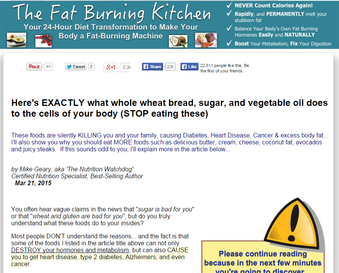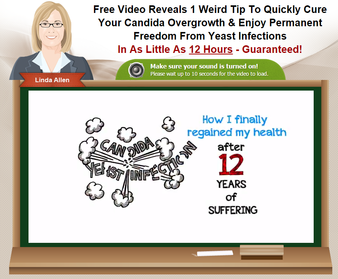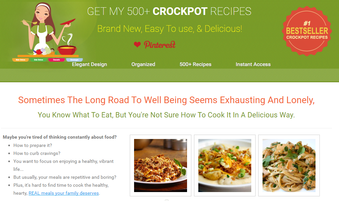 How many times have you had the following conversation? You're trying to persuade someone to do something, and they say “No, I don't like that”. You ask them how many times they have actually done that thing and they eventually admit they never have, but still maintain that they know they wouldn't like it. That is the way that many of us behave when it comes to food, and especially healthy food. The bare fact about eating healthily is that it involves expanding your range a little. Many of us will bellyache about trying a new food because we like what we are used to. The things that we have eaten for years were new to us once too, and the issue is one of being set in our ways. If you try something new every once in a while, you can become better acquainted with variety, and pick the new things that you really like. There is no point in banging your head against a brick wall trying to develop a taste for something you know you do not like. However, you'll never know if you like something until you actually try it. This is particularly true of international cuisine. It may look different, but millions of people eat it regularly, so it can hardly be poisonous. Taking a leap of faith and trying a different food is not going to be the death of you, so why not try something different once a week and surprise yourself with how much you enjoy it?  Often getting a healthier diet is not just about what you are eating, but how much of it. For example, there is no real reason to stop eating foods like pasta or cheese – but a mound that fills the plate is always going to be unhealthy. Many of us make the mistake of eating until it is uncomfortable to eat more. This is never going to work out well because we go on eating after we are satisfied and all of a sudden we have overloaded our digestive system. The digestive system is not like a muscle, that will get more powerful with every workout. We need enzymes to digest food, and when they are overworked it causes a deficiency. In this respect, eating healthily can be as much a matter of making small changes as doing anything radical. Even a seemingly cosmetic change like using smaller plates can be helpful. We are conditioned to think that empty space on a plate is a bad thing. All that really matters is how we feel after eating. If after a meal you don't feel hungry, then the meal has done its job. In France, a country with less of an obesity problem with most, the diet is far from boring. The major difference between there and many English-speaking countries is that they eat less food at a sitting. The French do not eat until they can eat no more – rather they eat until they have eaten enough, and enjoy the food for its taste. In this respect, there is a lot we can learn from them.  Healthy eating is not something that necessarily follows an easy pattern. It would be great if we could simply flick a switch and change our habits to make our diet healthier, but as we have free will and free choice, we will always be tempted to do something that may hurt us long-term. This means that we are reluctant to make a huge change – what if it fails, and we have gone to so much effort for something to fall apart? Instead of making one big change, there is a lot to be said for starting small and making several little changes that will be easier to maintain. Those smaller changes may seem to be nothing, but they add up. When you get up tomorrow morning and you have a choice between bacon and eggs and toast and cereal, think about what your body actually wants – there are more nutrients in the latter, and they won't cause a mid-morning crash. When you are offered “fries with that” if you go for a burger, say “no thanks” and enjoy a small treat that doesn't cause you to feel like you've transgressed. When you are asked how you would like your eggs, don't say “fried” or “I like mine with a kiss”. The latter is bad for you and the second isn't funny. Try having them scrambled or poached – in all honesty there is more taste and less fat from having them this way. Small changes like this soon add up.  Few of us can really say that we would not enjoy the chance to eat in a good restaurant more often, and there is no reason that we should turn our backs on restaurant eating once we go on a diet. However, the truth of the matter is that eating in a restaurant is not a risk because there are no healthy options or even that they are limited, but that we know so little about the healthy option. When we take care of the cooking of food ourselves, we know exactly what is going into it and how it is being prepared. In a restaurant we leave it up to the chef. When you look over the menu in a restaurant, it is a good idea to have a healthy option or two in mind, and then ask the waiter when ordering how exactly the food is prepared. Different restaurants will have different policies for how the food is cooked. Sauteed vegetables are usually healthy and delicious, but the difference between frying them in vegetable oil and fat is quite marked. Asking a few questions before committing to an order is never a bad idea, as long as you are polite and reasonable in doing so. There may be some concern that the serving staff will lie to you or tell you what they think you want to hear in order to make you pipe down and order – but if you are reasonable and polite to them, they will be likely to reciprocate, and take on board your specifications on how you would like something to be cooked.  If eating healthily was as easy as it should be, then the diet industry – books, DVDs, diet plans themselves and exercise equipment – would be in the doldrums. The fact that it is thriving to this day is a sign that, as much as we would like to think it, dieting is not easy or straightforward. We like to think of pasta as being the healthy option – many of us will replace fries with a serving of pasta when we are trying to lose weight – but unless we are careful, we can end up gaining more weight for the addition of pasta to our diet. A lot of it comes down to what we eat with that pasta. In some cases it is a thick, creamy sauce or a salad dressing that contains a bunch of calories. And even plain pasta can be a weight gain nightmare if we don't get the exercise to work off those carbs. Very often it is not what we eat but how we cook it that is the issue. Many of us will, for example, quite enjoy a nice steak every once in a while – as long as the fat is trimmed. But how we cook it affects how good it is for us. If you are frying it in oil or butter, then it will become unhealthy very quickly. If, however, you grill it or sear it in a pan, there is certainly no harm to enjoying it. One of the most enjoyable quick meals is a chicken breast with baby potatoes. Now, boiled potatoes can hardly be a diet destroyer, can they? Again, it depends what is done with them. If they are tipped out of the pan and have a mound of butter melted over them, they're as much a risk as fries. If they are drizzled with a little olive oil, then they're more than fine. |
Archives
March 2018
AboutThe world is a whole, with humans as part of the picture. Categories |
|
|
OTHER GREAT SITES
Please be sure to visit these other great sites! Become a Homeowner – Find out how Save Energy New Jersey FREE Secrets of the Indigenous Way On Line Shopping for the Coolest Stuff - Turkey Tale Trading Post Learn How to Make Money Selling your Pictures Let your Talents Shine Bright like a Light Native American Advancement Corp Main Page Up Close and Personal with a Nanticoke Lenni-Lenape YouTube Copyright © 2024 Native American Advancement Co, LLC. All rights reserved.
|
As an Amazon Associate I earn from qualifying Purchases. All Amazon links are "paid links"
Affiliate Disclaimer: Some of the links on this site are “affiliate links.” This means we may garner a small commission at no cost to you if you choose to make purchase or use their services. These small commissions help support the costs to maintain this website. Read our full Affiliate Disclosure Statement for more information. Click Here.
 RSS Feed
RSS Feed




